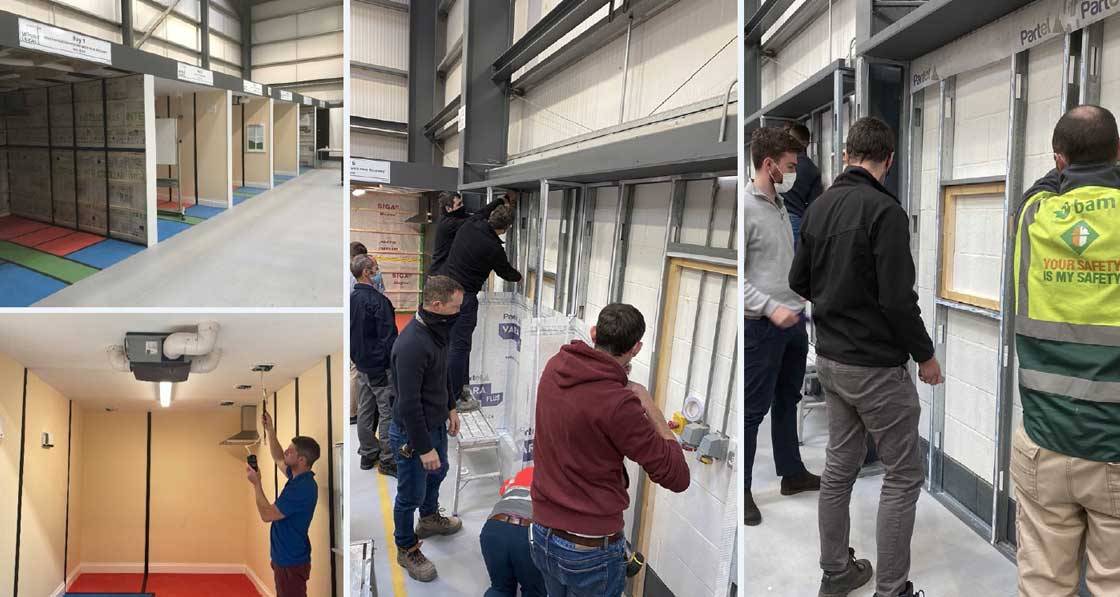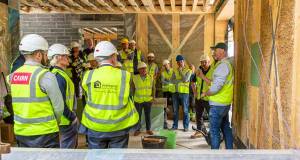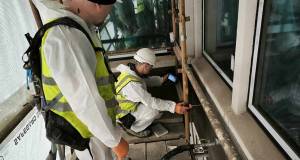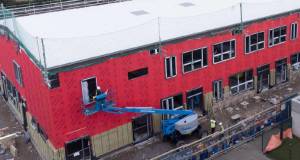
- Marketplace
- Posted
Tackling the retrofit skills shortage head on
The National Construction Training Centre in County Laois is aiming to meet the challenge of training the huge number of skilled workers needed for Ireland’s planned housebuilding and deep retrofitting programmes.
This article was originally published in issue 39 of Passive House Plus magazine. Want immediate access to all back issues and exclusive extra content? Click here to subscribe for as little as €10, or click here to receive the next issue free of charge
The national airwaves are buzzing on the topic of how Ireland can meet both the new home building and deep retrofitting targets with the current labour and skills shortage. One senior ESRI commentator recently proposed that it must be one or the other – that we simply don’t have enough resources for both.
Unless Ireland gears up radically in terms of skills for the retrofit sector, therefore, it is quite likely that new homes provision will take precedence and the ambition to retrofit 500,000 homes by 2030 will be scaled back.
Late in 2020, Minister Simon Harris set down his ambitions for the sector, announcing the National Construction Training Centre (NCTC), Mount Lucas as the centre of excellence in deep retrofitting/nearly zero energy building (NZEB) in the Midlands. The facility at the NCTC includes a large purpose-built deep retrofit hall of 600 square metres.
The retrofit training hall includes full-scale rigs representing the gamut of situations encountered on most projects — everything from roof, wall and floor insulation to airtightness application, ventilation installation and commissioning, and renewable energy installation. It is truly a showcase in terms of state-of-the art upskilling facilities for those involved in delivering deep retrofits.
An extensive suite of courses is available at the NCTC, all of which are fully funded for people in employment under the national Skills to Advance initiative. Three different course types are provided. First, there are shorter courses which are City and Guilds assured, and which focus on delivery of NZEB. These courses include the very popular NZEB Fundamentals (one day), NZEB Retrofit (two days) and NZEB Ventilation (three days). There are also trade-specific courses for carpenters, bricklayers, plumbers, electricians, and plasterers, as well as a more detailed programme for site supervisors.
The second category of courses include practical programmes which are industry-recognised, the objective of which is to ensure learners, including new entrants, have the skillset currently required by employers to contribute to the government’s retrofit targets. Examples of such courses include those on external wall insulation, internal wall insulation and airtightness.
The third category of programmes are longer courses which are QQI accredited, including Thermal Insulation Installation. These courses typically run for five to eight days and include formal assessment on completion.
The key attraction for learners attending the NCTC is the quality of training rigs which provides for a deep immersion experience. As well as learning about deep retrofit from a theoretical perspective, learners get to grips with the very latest products, details and application methods from expert tutors who are deeply passionate about delivering deep retrofits at scale.
We feel that we do not have to make a choice between new-build homes and deep retrofitting. The facilities, programmes and educational resources needed to deliver a growing pool of retrofit experts is now in place. There’s an exciting education programme for every level, from entry to expert.
Further information or to register for any of the programmes contact Jolene Hall at This email address is being protected from spambots. You need JavaScript enabled to view it. or see www.loetb.ie.
Related items
-
Air tightness training course to launch in Carlow this March
-
 Build Homes Better updates Isoquick certification to tackle brick support challenge
Build Homes Better updates Isoquick certification to tackle brick support challenge -
 Ecological Building Systems expands UK and Irish straw panel construction with EcoCocon deal
Ecological Building Systems expands UK and Irish straw panel construction with EcoCocon deal -
 Grant’s Aerona R290: A next-gen heat pump designed for the Irish climate
Grant’s Aerona R290: A next-gen heat pump designed for the Irish climate -
 Historic Dublin building retrofitted with cutting edge insulation
Historic Dublin building retrofitted with cutting edge insulation -
 Proctor gains ground with Scottish passive schools
Proctor gains ground with Scottish passive schools

